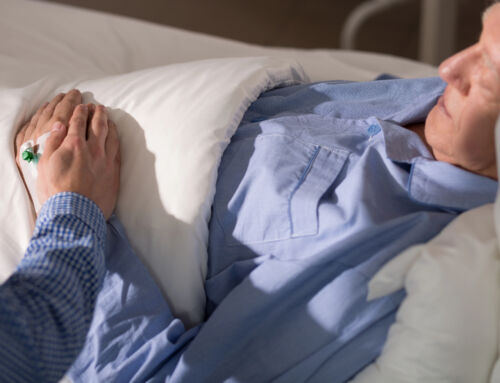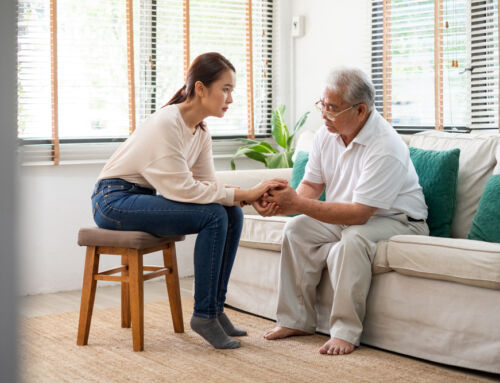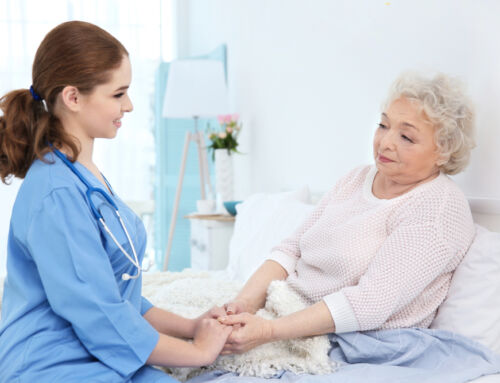Caring for aging parents can be a challenge during the best of times, but the rapid spread of coronavirus adds an extra element of stress. Older adults are particularly vulnerable to the virus and more likely to develop COVID-19 if infected, so keeping your relatives safe from disease is of extra concern during this pandemic.
The Pros and Cons of Bringing Your Loved One Home During the COVID-19 Pandemic
There are plenty of reasons for you to consider moving your older relative into your own home during the coronavirus pandemic. With extensive outbreaks occurring in nursing homes and assisted living facilities, many families are making the decision to bring their loved ones home for the duration of the crisis instead. Families with a relative in the hospital might also want to move the senior into a home setting instead of relying on a long-term care facility.
Adult children who are furloughed or out of work during the pandemic might have the time available to provide care for a loved one. Taking a senior relative into your home might also offer extra opportunities for family bonding between generations, especially when younger children are also in the home all day due to school and daycare closures. Seniors who remain in long-term care facilities may be isolated there for months without any contact with their loved ones.
One disadvantage of having an aging parent at home might be the time commitment involved with caring for a senior relative. Adult children who are trying to work from home and perform childcare or home schooling duties during the crisis may feel overwhelmed if they also bring an aging parent into the home. An organization that provides hospice care or palliative care can help ease the burden.
Making the Transition into Home Care
If you’re moving an elderly relative from a care facility or hospital into your home, there are some things you have to take into account. Determine who will be caring for the senior in your household and whether you need extra help in specific areas of home geriatric care. Caregiving services can provide assistance with tasks of daily living, such as dressing, medication management and personal grooming. You can also enlist home health professionals to help you make the transition between assisted living and home care.
Talk to the hospital or facility about a discharge plan before moving your senior relative into your home. Make sure you know which medications your elderly parent is taking and what follow-up tests or appointments are necessary. If rehabilitation services such as physical therapy or speech therapy are needed, determine where and when those will take place. Arrange any home health care services you need before your relative moves into your home.
You might need to modify your home to accommodate a senior with mobility issues. Some quick modifications are easy to set up yourself, such as installing safety bars in the bathroom and setting up temporary ramps to help wheelchair users bypass porch steps.
In addition to safety and health, there are practical concerns when moving an older relative into your home during the pandemic. Transfer any necessary mail or bills that you need to take care of while the senior is at your home. Consult with your relative’s doctor to make sure all prescriptions are up to date, and choose someone in the household to pick up refills as necessary. Stock up on one to three months of food, medication and household supplies to reduce the need for supply runs. Ask doctors and specialists about the possibility of telehealth visits instead of in-person appointments.
Safety Measures and Geriatric Care During the Coronavirus Pandemic
Because of the long incubation time and unique danger posed to seniors by the coronavirus, it’s important to institute health and safety measures in your home when caring for an elderly loved one. If you’re caring for a loved one at this time, keeping yourself healthy is the first step to making sure your senior relative remains well.
Choose a specific member of the household to handle grocery shopping and supply runs. Consider getting grocery delivery to minimize exposure to people outside your household, and opt for contactless delivery when possible.
Mask use helps reduce the risk of transmitting coronavirus to others. Even individuals who are asymptomatic can transmit the virus, so set mask usage rules for people who interact with vulnerable family members.
Sanitizing and cleaning can help reduce the risk of transmitting not only coronavirus but other viral and bacterial illnesses as well. Keep frequently used surfaces clean, and sanitize packages or other items coming into your home. If you order take-out meals, remove everything from the containers and put it onto plates before serving. Frequent handwashing by everyone in the family also limits germ exposure. Make sure to regularly clean any medical equipment or mobility aids that your elderly relative uses, such as wheelchairs, canes, handrails and walkers.
Seniors often value their social time, but the highly transmissible nature of this particular virus makes it necessary to limit in-person interaction. Adult children and younger grandchildren who are living in the home might schedule activities with the senior relative, such as card games or board games, to relieve boredom. You might also ask an older relative to teach younger family members a treasured cooking technique or favorite song to reduce feelings of loneliness and build a bond between generations.
If someone in your household becomes exposed to coronavirus, you might need to isolate that person away from any seniors in your home or isolate the elderly members of your household to avoid contact. Plan ahead and set up a guest room or private suite area in your house as an isolation zone in case it becomes necessary.
Health Planning During the COVID-19 Crisis
Hospitals dealing with COVID-19 patients often restrict visitation, which can make it difficult to manage the care of hospitalized loved ones. Even on floors or in wards with no COVID-19 cases, hospitals might not allow visitors. Determine how your family wants to handle a possible emergency, including who will bring the senior to the hospital and who can make care decisions.
You should also decide who in your family should be in charge of communicating with hospital personnel during an emergency situation or routine medical visit. This person can pass along information to other family members as needed.
If your aging parents do not already have an advance directive specifying the type of care they do and don’t want, set aside time to have this discussion with them. Make sure that any do-not-resuscitate orders or other specific directives are on paper. This might also be a good time to make sure your senior relative has an updated will and financial planning in place for an emergency situation. Seniors might also want to designate a health care proxy or assign a medical power of attorney to a specific family member so that person can make healthcare decisions for them.
Another form of planning to consider is how the care of an elderly family member might change if the primary caregiver becomes ill. Discuss the situation with other adult children or close relatives beforehand so you can smoothly transition geriatric care duties to another person if you come down with COVID-19 and have to isolate yourself away from the senior parent you have been assisting.
Contact Three Oaks Hospice for more information about preparing your home for a senior relative who is moving in with you during this COVID-19 emergency.







